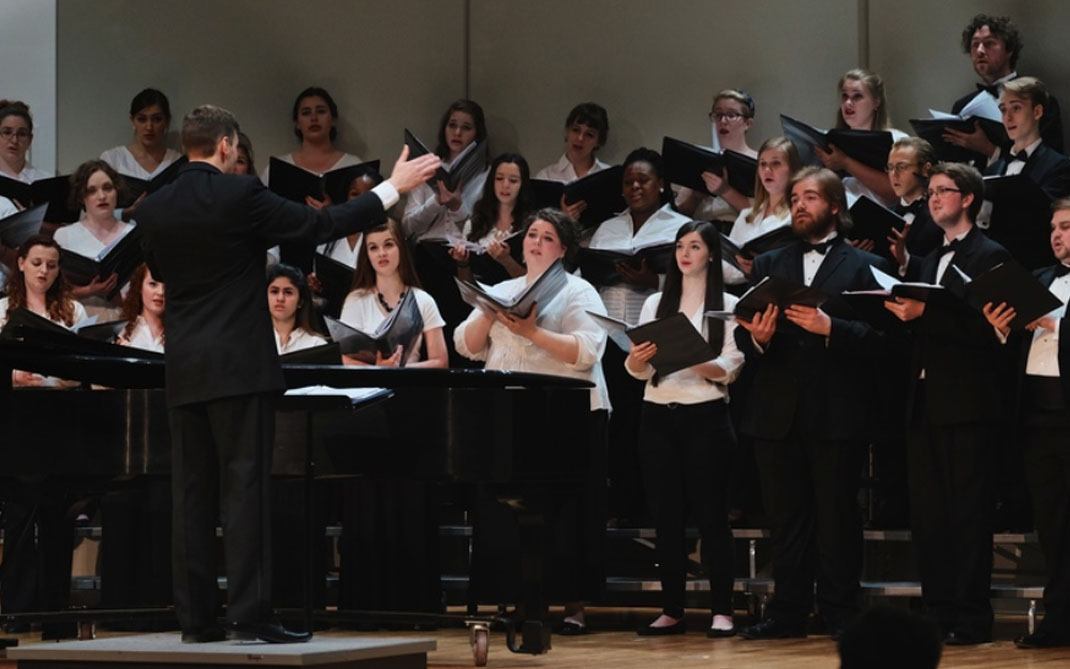2021 Spring and Summer EDIB Progress Report
On May 5, 2021, the Equity, Diversity, Inclusion and Belonging (EDIB) Advisory Committee completed its work and submitted 12 recommendations to the Chancellor and Provost. Implementing these recommendations will serve as the first pillar of the new strategic plan, UNCSA Forward.
Below, using the committee’s final report and recommendations as a structure, each initiative from the spring and summer of 2021 is categorized under the four themes that emerged during the process: Access and Success, Capacity Building, EDIB and Cultural Intelligence, and Support and Advocacy.
Access and Success
-
UNCSA announced a partnership with The Posse Foundation on a new initiative conceived in collaboration with renowned songwriter, actor, producer and director Lin-Manuel Miranda (“Hamilton,” “In the Heights”) to recruit, train and support talented students who might be missed through traditional avenues. UNCSA is the third school — and the first conservatory — to join Posse Arts, an expansion of the nationwide Posse Scholars program. The Posse Foundation partners with top institutions that view diversity as integral to excellence. Many Posse Scholars are often the first in their families to attend college, or come from historically underrepresented communities.
- During the spring and summer of 2021, UNCSA employed 32 people. Many of those hired
during this time frame are in leadership positions, 59% identify as female and 38%
are from underrepresented minorities.
- These hires contributed to a year-over-year (YOY) growth from 15.5% to 19.4% of Exempt
from the Human Resources Act (EHRA) Non-Faculty employees from underrepresented minorities.
The percentage of female-identifying EHRA Non-Faculty roles increased from 53% to
56% YOY.
- The percentage of EHRA Faculty from underrepresented minorities declined slightly
from 7% to 6.3% YOY. The percentage of female-identifying EHRA Faculty rose from 37%
to 39% YOY.
- The percentage of Subject to the Human Resources Act (SHRA) employees from underrepresented minorities declined slightly from 29.7% to 29.4% YOY. The percentage of female-identifying SHRA employees rose from 50% to 51%. YOY.
Capacity Building
- Over the summer, the chairs of the Faculty and Staff councils along with the leadership
from the Student Government Association and other key student stakeholder groups met
to begin acting on one of the recommendations from the EDIB Advisory Committee: to
form a new shared governance committee on EDIB featuring representation from faculty,
staff, students, alumni and community members.
- Student Affairs: Provided space and resources for the following student events and initiatives: Soul Museum: Celebration of Black Artists and Activists Posters; Artists of Color Open Mic; Live Art Museum: Behind Closed Doors; series of Black-Owned Food Truck Days; Artists of Color Volleyball Tournament; Black History Showcase: a live filmed event; Asian American Pacific Islander (AAPI) Digital Poster Commission, and Black Artists Mural Commission.
EDIB and Cultural Intelligence
- Dance: Continued to build a sustainable, equitable and inclusive environment where cultural
diversity is celebrated and valued. For the spring semester, faculty and staff worked
to address equity, diversity and inclusion in a variety of ways, which included: curricular
expansion and adjustments that celebrate the work of a wide array of artists of color;
expansion of the dress code to include flesh tone dancewear; engagement of diverse
guest faculty, choreographers and lecturers; and outreach conversations with Preparatory
Dance and year-round program to provide dance education to local underserved communities.
View detailed report.
- Design & Production: Added the course Arts In Context: Exploding the Canon, which centers on stories and
artists from underrepresented and other minority populations. The course investigates
the process of text analysis and collaborative art making.
- Student Affairs: Student Affairs leadership and new residence life team members engaged in workshops
related to EDIB. Specifically, the leadership team participated in a workshop entitled
“Operationalizing Inclusion and Diversity.”
- High School: This was the first year that summer reading was required for students. Each grade
level was assigned a different text and discussed in small groups with faculty and
student affairs staff facilitators on High School Experience Day. In preparation for
these discussions, students were asked to consider the following: "For our discussions
on High School Experience Day, please think about how your particular texts might
inform how you think about the concepts of identity and community. How do you define
identity? How do our identities shape community? To what communities do you belong
and what is your relationship and responsibility to these communities? In other words,
what does it mean to live in community with other people? And what might that mean
for us at UNCSA?" The reading assignments included: Amanda Gorman’s inaugural poem
“The Hill We Climb”; “We Are Displaced: My Journey and Stories from Refugee Girls
Around the World,” by Malala Yousafzai; “Enrique’s Journey: The Story of a Boy’s Dangerous
Odyssey to Reunite with His Mother,” by Sonia Nazario; and “The Immortal Life of Henrietta
Lacks” by Rebecca Skloot.
- High School: High School Faculty and Staff have embraced EDIB training as an essential and ongoing
element to becoming a more inclusive and welcoming community. A daylong workshop with
consultants Keryl McCord and Lisa Mount took place in August, for which Faculty and
Staff read and discussed “Thick” by Tressie McMillan Cottom, a sociologist at UNC-Chapel
Hill and frequent contributor to the New York Times. The book explores a range of
topics, including Black womanhood, body image, and McMillan Cottom's experience as
a Southern Black woman academic, and was a finalist for the 2019 National Book Award.
- High School: Connected to the training mentioned above, High School Academics has also made considerable changes across the curriculum to expand the range of voices in the classroom. In particular, a new series of topic-specific senior English seminars includes: Changemakers; Introduction to Creative Writing; Introduction to Film Studies; Introduction to Women’s, Gender, & Sexuality Studies; Poetry and Performance; Reimagining Justice; and The American Experience.
Support and Advocacy
- Drama: Focused on serving the needs of AAPI students. During Intensive Arts in 2019, the
AAPI students collaborated outside of class to create a piece about their sense of
loss of culture and assimilation based on their families' various experiences of emigrating
to America. This experience led them to request the inclusion in the season of a project
specifically for the AAPI student population. Ongoing discussions are being held to
explore performance opportunities that will serve the unique needs of this population.
Students were connected to the Asians Dramaturg Network, based in Singapore, which
conducted a wonderful exchange of ideas and possibilities.
- Drama: In April, the drama voice program brought in Joy Lanceta Coronel, a world-renowned voice and speech teacher who authored the groundbreaking article, "Strategies for Guiding Actors' Accent and Linguistic Needs in the Twenty-First Century.” She is a leading authority on coaching AAPI actors and teaching accents of the Asian continent. She led second year students through a workshop on identity in voice and accent work, and has forged ongoing mentor relationships with students. This work led the School of Drama to produce the play “Passage” by Christopher Chen, which will be directed by guest artist Nana Dakin, who divides her career between working in Thailand and the United States after receiving her M.F.A. in directing from Columbia. Together, these experiences have led to a sense of solidarity and an enhanced sense of belonging in the School of Drama for AAPI students.
October 25, 2023





